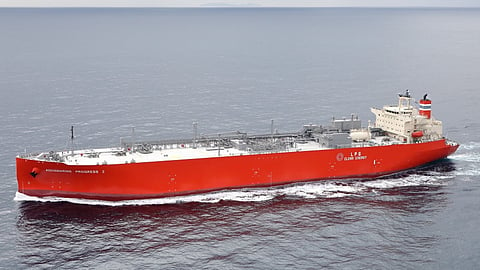VESSEL REVIEW | Aquamarine Progress II – Aramo Shipping's new gas carrier capable of LPG and ammonia transport
Aramo Shipping (Singapore), a company under Japanese shipping company the MOL Group, has taken delivery of a new very large gas carrier (VLGC) built by Namura Shipbuilding.
The NK-classed Aquamarine Progress II was designed as one in a series of two VLGCs capable of transporting both LPG and ammonia. It will sail under a time charter contract with Japanese LPG importer and distributor GYXIS Corporation.
The VLGC has an LOA of 230 metres (750 feet), a beam of 36.6 metres (120 feet), a moulded draught of 12 metres (39 feet), a deadweight tonnage of 56,805, a gross tonnage of 50,849, a total cargo tank capacity of 87,119.3 cubic metres (3.076 million cubic feet), and a crew of 29. Power is provided by one MAN B&W 6G60ME-C10.5-LGIP-EGRBP main engine with a rated output of 12,400 kW (16,600 hp) driving a conventional propeller while electrical power for the onboard systems is drawn from four 5,050kVA generators.
Efficiency-enhancing feature suited for long voyages
The ship’s dimensions are within the maximum limit allowed by many of the major LPG terminals in Japan even though its cargo capacity is larger than that of earlier vessels. The ship itself also satisfies the performance standards for ballast tank coatings (PSPC-WBT regulations) to prevent corrosion of the ballast tanks, thus further improving safety.
The propulsion performance is improved through the incorporation of an optimal hull form and aft energy-saving features. The main engine is equipped with electronic controls to improve fuel efficiency and economy.
The dual-fuel vessel can run on either LPG or conventional heavy oil. MOL said that, when LPG is used as fuel, the vessel's CO2 emissions can be reduced by about 20 per cent and SOx and particulate matter emissions can be reduced by about 90 per cent compared to heavy oil.
The vessel meets the requirements of the EEDI Phase III while the main engine and the generators comply with IMO Tier III NOx emissions regulations. A pneumatic stern tube sealing system is also fitted.
Aquamarine Progress II will sail under the flag of Singapore. Development of the VLGC was undertaken jointly by Namura Shipbuilding and Mitsubishi Shipbuilding.


